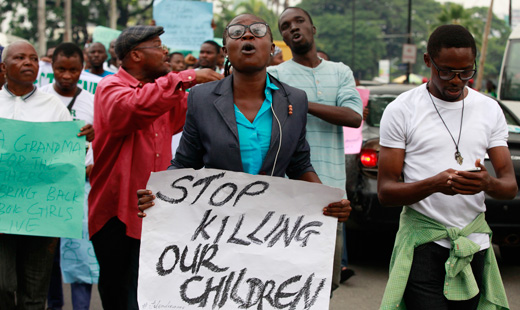
A wave of revulsion has spread worldwide over the news of the kidnapping of at least 276 young girls from a school at Chibok, in Borno State in Northwestern Nigeria by the violent Boko Haram sect. This revulsion has been intensified by the slaughter this week of at least 300 villagers in nearby Gamboru Ngala, on the Nigeria-Cameroon border.
“Boko Haram” means “Western Education is forbidden” in a mixture of Hausa and Arabic. The ultra-violent sect is just the latest of a series of such groups, going back to the 1970s, which consider that “western”, meaning modern, education is sinful because of its teaching of scientific concepts, because it is associated with Christian proselytization, and because it promotes the education of women and thereby alters patriarchal gender relations.
But this is not the whole story.
Modern Nigeria, with its 170,000,000 people Africa’s largest state, is a product of British and French colonial rivalries in West Africa in the late 19th and early 20th centuries. Feudalistic Muslim emirates, stretching East to West along the Sudanic belt of West Africa, were seized by the direct or indirect military intervention of the rival colonial powers.
Borno Emirate, where Boko Haram started, was an ally of the British, so when it became part of the Empire in Africa in 1905, the ruling dynasty was kept on. The idea of administering colonial possessions through traditional rulers (“indirect rule”) was promoted by colonial administrator Lord Frederick Lugard, who extended the practice to other Muslim principalities. As governor of Northern and Southern Nigeria from 1912-1919, Lugard continued the policy of leaving the North essentially neglected under the control of traditional feudal rulers, while southern areas were developed more but without concessions to labor unions and democracy.
When Nigeria got independence in 1960, the stage was set for north-south frictions that have persisted to this day. A 1966 coup by junior army officers from the South, in which a number of Muslim leaders were killed, set off bloody reprisals against Southerners living in the North, followed by the Biafra war of independence. Since then, friction between the Muslim North and the mostly Christian South, and a series of military coups, has bedeviled Nigeria.
The roots of Boko Haram, whose full name is “The Congregation of the People of Tradition for Proselytism and Jihad”, lie in the isolation, backwardness and poverty of the North. The sect had its origins in Maiduguri, the capital of Borno, and recruited its first adherents from poor and unemployed youth. It was formally founded by Mohammed Yusuf in 2002, but did not begin violent attacks against Christians, orthodox Muslims and government facilities until some years later.
Yusuf was killed by government forces in 2009 and succeeded by the present leader, Abubakar Shekau. At that point, attacks by Boko Haram became much more frequent and violent, hitting their stride in 2012 and 2013 and including several deadly attacks in Nigeria’s capital, Abuja.
Christian churches have been destroyed and their parishioners massacred. Many students and teachers have been killed in attacks on schools. The girls at the school at Chibok had returned to prepare for examinations after threats had previously closed their school. They were kidnapped in mid April but only this past week has this become a national and international scandal.
What has turned the world’s attention to Boko Haram has been the kidnapping of the girls, who include both Muslims and Christians. In attacks on schools, Boko Haram has often killed all the boys, but this time Abubakar Shekau had a video made in which he laughingly boasts that the girls he has captured would now be sold as slaves, by order of God: “I sell women!” The image of lascivious old men buying little girls has added to the worldwide furor over the incident.
Anger exploded all over Nigeria, much of it directed not just at Boko Haram but at the Nigerian government of President Goodluck Jonathan, a Southerner, who is seen as having been slow and ineffective in mobilizing security forces to search for the girls. Muslim leaders denounced Boko Haram as distorters of Islam. Demonstrations have been carried out all over the country and, through social media, have now reached worldwide proportions. There have been demonstrations in Washington D.C., and the Obama administration is announced that it is sending intelligence and logistical military help to Nigeria, though not “boots on the ground”. This adds to an increasing U.S. military presence in Africa.
Yet there are also complaints that the Nigerian military have already, before the kidnapping, gone after Boko Haram’s social base with extreme harshness, committing many murders and other violations of human rights. And a similar hue and cry to go after Joseph Kony of the violent “Lord’s Resistance Army” in Central Africa has so far not brought him to book, in spite of a U.S. military aid mission and a social media campaign in the United States.
Boko Haram can easily move across international borders to evade pursuit. Some reports suggest that the girls have been moved into a forested area in neighboring Cameroon, while others speculate that they have been moved into islands in Lake Chad which abuts on Borno State, or that some of them have already been sold.
There is a danger of losing sight of the root of the problem, namely the neglect and poverty of huge areas of Africa like Borno State.
Photo: A demonstration calling on government to rescue kidnapped school girls, during workers day celebration in Lagos, Nigeria. May 1. (AP Photo/ Sunday Alamba)












Comments